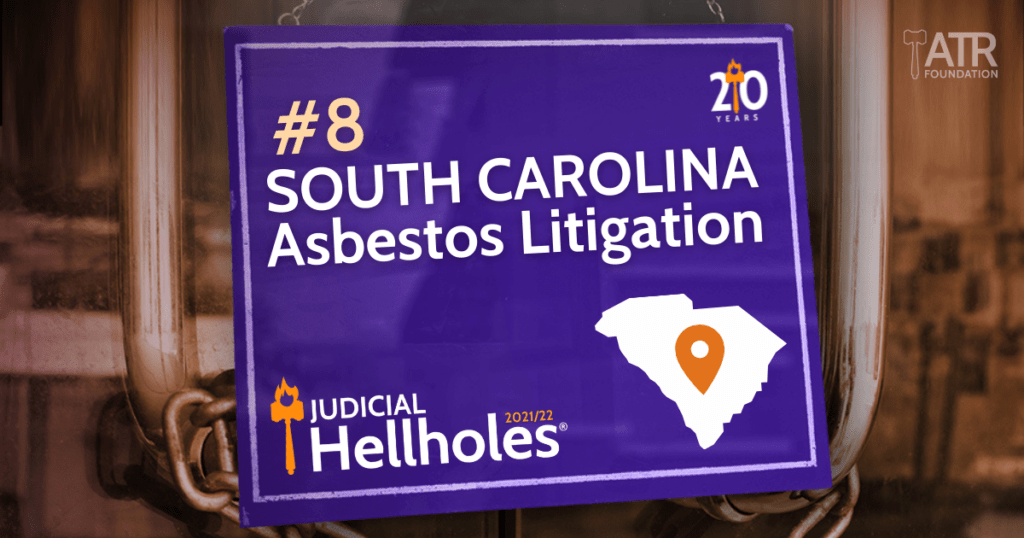‘Highly Unusual’ Rehearing of Louisiana Case Raises Judicial Independence Concerns
Louisiana Supreme Court Waffles Under Political Pressure, ATRA Brief Urges Court to Stand Strong

State’s asbestos docket maintains status for second consecutive year
South Carolina’s asbestos litigationis back for the second year in a row among the worst “Judicial Hellholes®” in the country, according to the latest report from the American Tort Reform Foundation (ATRF).
In its 20th anniversary edition of the annual report, ATRF says Judge Jean Hoefer Toal, who oversees South Carolina’s asbestos docket, has built a plaintiff-friendly reputation for asbestos lawsuits in the Palmetto State.
“Judge Toal has a record of broad rulings, overturning or modifying jury verdicts with which she disagrees, and consolidating vastly different cases,” American Tort Reform Association President Tiger Joyce said. “We’re seeing a concerning pattern of allowing abuse of the discovery procedure, imposing severe and unwarranted penalties during trials, as well as low standards for evidence.”
ATRF reports that in several asbestos cases, Judge Toalhas made the unusual move of naming insurance carriers as the “alter egos” of their insureds.
“Judge Toal’s procedurally irregular handling of South Carolina’s asbestos lawsuits is alarming,” Joyce said. “It brings into question her ability to serve with impartiality and has created a risk of actual bias for those who must defend themselves before her in court.”
In September 2021, a jury awarded $32 million to a worker whose wife died from mesothelioma allegedly caused by second-hand asbestos exposure. Judge Toal presided over the case but precluded the jury from hearing evidence that could have significantly altered the outcome. ATRF states that the jury did not learn that the woman was not only exposed to asbestos on her husband’s clothing, but that both her father, an insulator, and her uncle, each worked in environments where asbestos was present.
“If Judge Toal continues to oversee the state’s asbestos lawsuits, trial lawyers and their clients will know they can turn to South Carolina, a Judicial Hellhole, to exploit the troubling and inequitable practices of Judge Toal for a large payout,” Joyce said.
Texas trial lawyers from the Law Offices of Dean, Omar, Branham and Shirley and their local counsel Kassel McVey are very active in South Carolina’s asbestos docket, and tend to find favor with Judge Toal, according to ATRF.
Although national asbestos filings are down 9%, filings are skyrocketing in South Carolina due to the activity of Dean Omar, which increased their filings by 400% between 2017 and 2020.
“Dean Omar Branham Shirley routinely demands overbroad discovery in conjunction with corporate defendant depositions, in which defendants are required to turn over what defendants believe are excessive, irrelevant, and often impossible to produce documents,” Joyce said. “When defendants can’t comply, or Dean Omar just does not like the answers at the deposition, the firm seeks sanctions.”
In the first asbestos case heard by Judge Toal, Jolly v. General Electric Co., the jury returned a modest award, but Judge Toal then increased the award by $1.6 million. She then let the plaintiffs’ firm manipulate setoff, which protects a plaintiff from recovering twice for an injury by allowing the plaintiff to subtract money already paid to the plaintiff by the defendant or by other sources for the same injury.
“Judge Toal has made a habit of increasing jury awards and gave a windfall to the plaintiffs by allowing them to manipulate procedural laws during trial,” Joyce said.
In September 2021, however, the South Carolina Court of Appeals upheld the increased award.
“The hope was that the anxiously awaited appellate court decision would rein in Judge Toal and restore some fairness and balance to asbestos litigation in the state,” Joyce said. “Unfortunately, this decision likely will only further embolden the trial bar.”
ATRF says a recent study by John Dunham & Associates determined that certain reforms could save state residents and businesses more than $2.3 billion, supporting nearly 27,000 additional jobs and $4.18 billion in increased economic activity. South Carolina residents pay an annual “tort tax” of $450 per person.
South Carolina’s asbestos docket is one of eight Judicial Hellholes® in the 2021-2022 report:
Its drop in this year’s rankings is not indicative of reforms but instead a lack of activity due to COVID-19 shutdowns.
Judicial Hellholes® are deemed the most unjust local courts and state civil justice systems in the country. Read the full report at JudicialHellholes.org.
Louisiana Supreme Court Waffles Under Political Pressure, ATRA Brief Urges Court to Stand Strong
Left unchecked, these jurisdictions will continue dragging down economic growth and undermining justice through rampant lawsuit abuse.
Claimants Given Opportunity to Vote on Plan; Judge to Reconsider Scientific Validity of Plaintiffs’ Experts
Legitimate consumer protection demands sound science and impartial analysis — not distorted data designed to manufacture lawsuits.
Law Firms Spent $168M+ on 2.2M Ads in Georgia
ATRA’s Latest Studies Reveal Financial Influence and Lack of Transparency in Pennsylvania’s Campaign Finance Systems